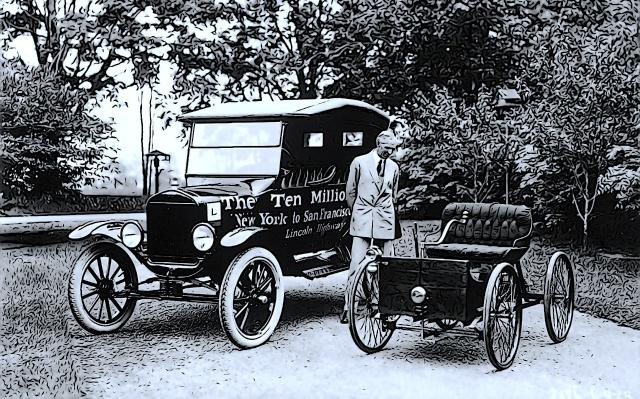 In 1914, on route to interviewing Henry Ford, a reporter saw Ford cruising down the street in the new touring car, carefree with all the windows open. On investigation, the reporter found that Ford could regularly be seen test driving the new models around the streets of Detroit. He was a pioneer of industrial America, perhaps one of the most renowned businessmen of all time, yet he still found time to test his product. It may seem a little cliché, but the fact that Ford knew his products so well, almost definitely contributed to the global status the company holds today.
In 1914, on route to interviewing Henry Ford, a reporter saw Ford cruising down the street in the new touring car, carefree with all the windows open. On investigation, the reporter found that Ford could regularly be seen test driving the new models around the streets of Detroit. He was a pioneer of industrial America, perhaps one of the most renowned businessmen of all time, yet he still found time to test his product. It may seem a little cliché, but the fact that Ford knew his products so well, almost definitely contributed to the global status the company holds today.
As Ford demonstrates, truly knowing your product requires more than analyzing data, determining marketing strategies and reading reports. Yes, they are necessary. Without attending to those strategies, businesses fail. However, some lessons need to be taught outside the office. To truly know your product, you and your team need to be customers as well as employees. Here’s how being your own customer can benefit the whole company.
From a Business Owner’s Perspective
Ford is not the only business leader who tested his own product. Until last year Brian Chesky’s (founder of Airbnb) listed his own living room sofa on his company’s website. Why? Because Chesky is aware of the dangers of becoming too detached from the basics of his own business.
Knowing your product by using the product doesn’t just apply to leaders of multi-billion dollar world-famous corporations. Any small business or startup founder should be aware that the greater vision for the company may obscure the importance of everyday interactions with customers.
To maintain perspective, set aside time each week to use your product as a customer and see your business through the customer’s eyes. Besides helping you identify the flaws in your business, it will help you celebrate successes and fundamentally keep your feet on the ground.
At Fat Lama, a peer-to-peer equipment rental platform, every member on the team has items listed for rental on the platform, including the CEO. This keeps all departments in touch with the product directly and allows them to make recommendations for improvements from a customer’s perspective. This process is especially vital for startups or young companies, since survival of the company can depend on good customer experience in the early days.
From a Marketing Perspective
If you wish to create a marketing strategy that is tailored exactly to your customer’s needs, try taking the time to test your product yourself. This allows you to understand their reasons for using your product first hand and to create a campaign that appeals directly to your customers and clients.
In addition, using the product allows each member of your team to identify their favorite feature. This makes it much easier to infuse your marketing campaigns with enthusiasm and, most importantly, humanity. When planning marketing and PR campaigns, it’s easy to rely solely on data to inform your strategies. But numbers and surveys can only go so far towards defining your audience demographics, and they can often result in campaigns that are technically correct but do not resonate with real people. You’re more likely to produce effective marketing messages when you have experienced the platform yourself.
From a Customer Service Perspective
If you use your own product, you’ll first notice the customer service. Unless you work in the customer service department, it’s easy to fall into the trap of thinking about your users as numbers on a spreadsheet rather than real thinking, feeling people. This is a mistake that can kill businesses early on, especially with the prevalence of online reviews nowadays.
Yet, a customer service shortcoming is a relatively easy problem to fix. When you swap hats and step into the customer’s shoes, you’ll instantly spot where your business fails to support its users properly. Crucially, it will also serve to remind you how and why customers use your product.
Example: When Jonah Peretti launched BuzzFeed, he and his team spent weeks researching trending articles and topics. They knew that as “customers” themselves, they would be able create a site that gave users exactly what they wanted. Being in tune with your clientele’s demands requires more than just quantitative research. You should be able to see what your users see.
That being said, being your own customer shouldn’t be forced on your company; it should come naturally to the team. Since the employees have chosen to work at the company, using its products should be a joy. Ford was not just thinking of his business when he drove around Detroit. He did it because he enjoyed driving and delighted in the cars he made. Be proud of what you have achieved as a team and take time to enjoy what you’ve built together.
Flora Dallas is a content writer for Fat Lama, a peer-to-peer rental platform. The platform provides a cost effective alternative to purchasing items, while allowing lenders to make money by renting their unused possessions.



